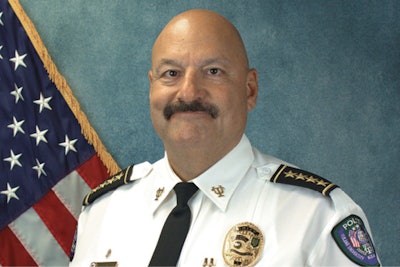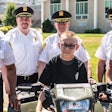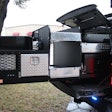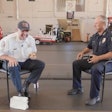 Tulane University Police Chief Kirk Bouyelas came to a department with serious morale problems in 2018 and has transformed it into a much more effective and respected force. He has also added new programs to improve officer emotional and physical wellness.
Tulane University Police Chief Kirk Bouyelas came to a department with serious morale problems in 2018 and has transformed it into a much more effective and respected force. He has also added new programs to improve officer emotional and physical wellness.
In 2018 when Kirk Bouyelas left the New Orleans Police Department after 32 years to assume leadership of Tulane University’s Police, he knew he was taking command of a dispirited force. The previous chief had resigned under fire, the department had been accused in the media of covering up excessive force, and officers said morale was very low during a survey.
Today, Bouyelas says the police force for the New Orleans-based private university is much more respected and it’s officers are happier. He credits the turnaround to a focus on the “3 C’s”—crime, community, and cops.
The Tulane University Police Department is a force of about 100 sworn officers. Their jurisdiction is all the Tulane properties, including the main campus, the hospital and medical school, and the Tulane National Primate Center 40 miles away in Covington. It also has an agreement with the NOPD that Tulane officers can patrol a one-mile perimeter off of the university properties. So Tulane officers see their share of the first “C”—crime. Bouyelas says his officers are dedicated to protecting the Tulane community through “ethical, moral, and constitutional policing.”
The second “C,” the community the Tulane Police serves, is the students, faculty, and staff of the university. One of the first things Bouyelas did to engage with the community was to work with Dr. Bernice Houle in the Tulane Office of Assessment and Institutional Research to build surveys for gauging opinions about the department. Now the opinion of the officers is much more favorable.
The third “C” is cops, specifically support for cops. Bouyelas says supporting cops can take many forms, including caring about the mental and physical health of the officers. Working with the Tulane Living Well Clinic, Bouyelas began developing programs to improve officer fitness. One of these was the Chief’s Challenge in which officers wear fitness trackers and try to have more steps at the end of the month than Bouyelas. “It’s a beat the chief, win a prize kind of thing. But it wasn’t my doing. I had some officers here who really took hold and took charge,” Bouyelas says.
The challenge has grown to include a 9/11 Stair Climb and other group events such as runs, walks, and bike rides. As part of the Chief’s Challenge, the Living Well Clinic maintains electronic medical records for the participants, tracking BMI, waist circumference, hemoglobin, A1c, cholesterol, and blood pressure.
To complement the physical wellness program, the Tulane PD has also started an officer mental and emotional resilience program that includes peer support. The officer in charge of program was actually sent by the department for training and is certified in peer support. Bouyelas says the Peer Support Team helps officers with stress and emotional health issues.
Bouyelas says supporting his cops also means making sure they are as prepared as possible to do the job safely and professionally. “I have to make sure that the officers have the equipment, resources, and training. I’m a big proponent of training,” he says.
The chief is such a big proponent of training that Tulane PD is making plans to add a new training center. “It’s going to be a dedicated training center for our officers and for officers from smaller campus and municipal police departments that don’t have the resources we do,” Bouyelas says.
Tulane University’s Police Department plans to provide other agencies with access to these training resources at no charge. “We’re blessed to work at Tulane. Tulane is an institution with resources, and I’m a firm believer in sharing those resources with other departments,” Bouyelas explains.

















